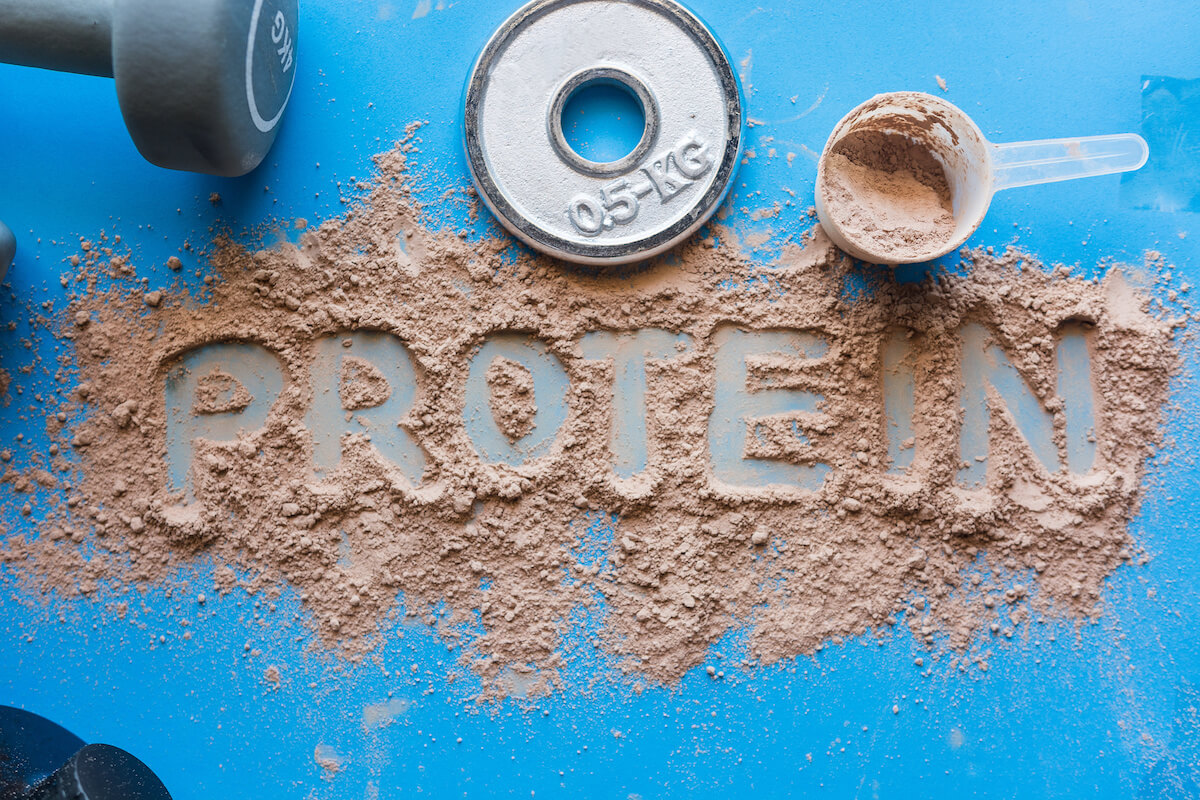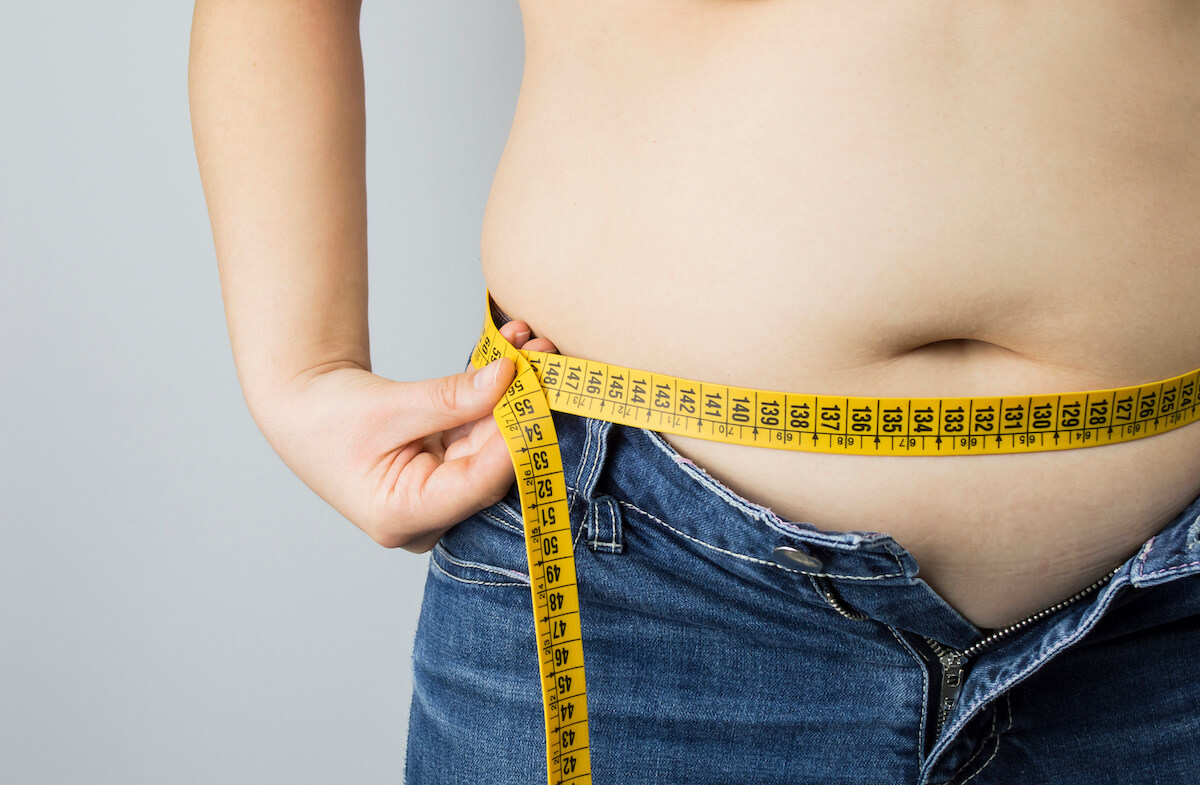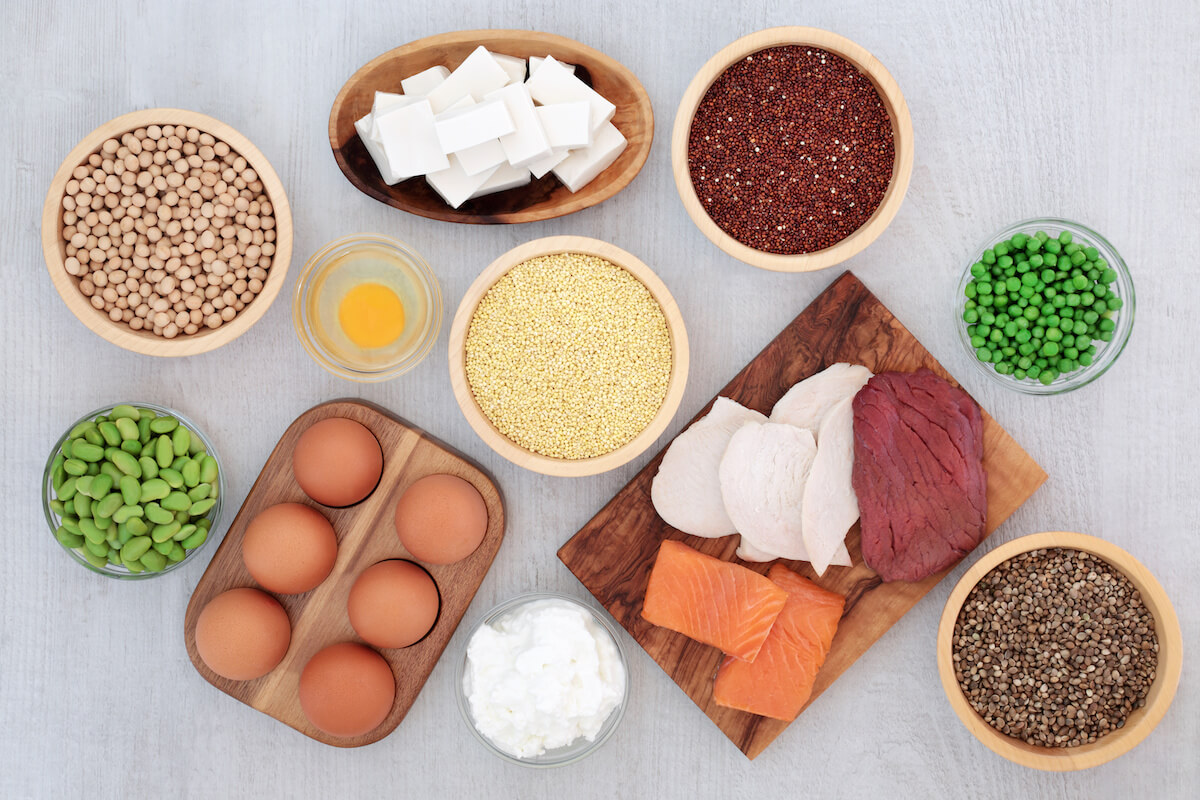
08 Aug Does Protein Make You Gain Weight? Get the Facts
Increased protein intake has long been associated with weight loss and building muscle — it helps you feel full for longer than carbohydrates and is essential for muscle growth. But does protein make you gain weight? The short answer is no; a high-protein diet does not cause weight gain. But, it is possible to gain weight by eating too much protein.
This guide explores protein consumption and how it relates to metabolism, what your body uses protein for, and the best types of protein to add to your diet. We’ve also included average protein intake requirements based on activity level and tools to help you track what you’re eating.
Understanding Protein

Dietary protein is one of three macronutrients — carbs, fats, and proteins — vital for every cell in your body. Protein consists of building blocks known as amino acids. When you eat protein, your body breaks it down into amino acids and uses them to build, maintain, and repair your muscles, bones, tendons, and organs.
What Are Essential Amino Acids?
Amino acids fall into two categories: essential amino acids and non-essential amino acids. Your body can make non-essential amino acids, but it must get essential amino acids from your diet. When a protein source includes all nine essential amino acids, it’s a complete protein. Animal products like meat, fish, eggs, and dairy, as well as some vegan food sources like peas and hemp, contain complete protein.
It’s important to focus on sources of complete protein in your diet so that your body has all of the amino acids it needs to function correctly. This is especially true for those who eat plant-based diets.
Do High-Protein Diets Increase Your Metabolism?
Your metabolism refers to the number of calories you need to eat each day to meet your energy requirements. Increasing your metabolism means increasing the number of calories you burn at rest, allowing you to eat more calories without gaining weight. Various factors help determine metabolism, such as weight, age, body composition, daily diet, and overall health.
Another thing that determines your metabolism is the thermic effect of food (TEF), which refers to the calories your body burns while digesting and metabolizing food. The TEF varies by nutrient:
- Fat: 0-3%
- Carbs: 5-10%
- Protein: 20-30%
So, if you eat 100 calories of fat, you might burn 0-3 calories digesting it, and if you eat 100 calories of carbs, you might burn 5-10 calories through the thermic effect. And if you eat 100 calories of protein, you might burn 20-30 calories digesting that. So, extrapolate that to the number of calories you eat daily, weekly, monthly, and yearly, and 20-30 extra calories burned for every 100 calories of protein adds up.
Protein may also increase satiety (how full you feel after a meal) and decrease fat mass. It’s also crucial for increasing your muscle mass. When you have more lean muscle, you burn more calories in a state of rest and raise your metabolism.
Does Protein Make You Gain Weight?

Weight gain occurs when you eat more calories than you burn each day. So, eating excess protein and adding extra calories to your diet could make you gain weight. But if your diet doesn’t comprise excess calories, a high-protein diet will not make you gain weight.
It’s best to work with a doctor, dietitian, or nutritionist to figure out how many calories your body needs and what your ideal macronutrient balance is, so you can be sure you’re getting everything your body needs to thrive. You can also use an online calorie calculator to get an estimate to take to your healthcare professional.
Here are some common factors that contribute to weight gain, increased body fat, and difficulty losing weight:
- Genetics: Genetics play a role in weight gain, but you can overcome this factor with a good diet and exercise routine.
- Junk food: Processed foods are often full of added sugar and refined carbs without much nutritional value and are usually very high-calorie. Aggressive marketing tactics also contribute to junk food intake.
- Food addiction: With the added sugars, fats, and flavoring agents in most processed food, the risk of becoming addicted is a reality. With addiction comes neurochemical changes in your brain (like those that occur with addictive drugs), allowing your cravings to take control.
- Sedentary lifestyle: Spending all day sitting means burning fewer calories and building less muscle, which lowers the amount you can eat each day without gaining weight.
- Health and medications: Many medications and health conditions can lead to weight gain — ask your doctor for more information to find out if this is causing your weight gain.
And here are some of the health benefits of eating enough protein:
- Decreased cravings, hunger, and appetite
- Increased strength and muscle mass
- Improved bone health
- Higher metabolism
- Lower blood pressure
- Easier time maintaining or losing weight
Again, does protein make you gain weight? No, but it does help build muscle, control appetite, and improve metabolism. Keep in mind there may be other consequences: A 2016 study did find that higher animal protein intake is associated with fatal and non-fatal cardiovascular complications.
How Much Protein Do You Need?

Determining your protein needs will help you balance your diet and reach your goals. Protein requirements vary from person to person, but you can roughly estimate how much you need based on your activity level and body weight.
- Average to moderate: The recommended daily intake for people with average to moderate activity levels is 0.8 grams of protein per kilogram of body weight (or 0.36 grams per pound of body weight).
- Moderate to high activity levels: Those who are very active (or suffering from age-related sarcopenia) may need up to 1.5 grams of protein per kilogram of body weight (0.68 grams per pound) each day.
- Very high activity levels: Professional athletes, bodybuilders, and those who are extremely active may need up to 2 grams of protein per kilogram of body weight each day (or 0.91 grams of protein per pound).
Since the amount of protein your body needs daily varies based on your current activity levels and body weight, it’s best to update your macronutrient goals regularly. For example, if you start a strength training routine that increases your activity levels, you’ll need more protein per pound of bodyweight.
What Happens if You Eat Too Much Protein?
Occasionally eating more protein than you need isn’t dangerous, but nutritional specialists recommend staying within your recommended daily intake. If you’re regularly eating a lot more protein than you need — for example, 200 grams when you only need 100 grams — you might notice some of the following side effects:
- Weight gain: Protein has four calories per gram, so if you’re eating 100 extra grams of protein, that’s 400 extra calories per day. And if that puts you 400 calories over your caloric needs, it’ll add up to almost a pound of fat per week!
- Bad breath: During protein synthesis, your body breaks protein into amino acids. So, overeating protein results in excess amino acids in your body, which combine with the bacteria responsible for cavities and bad breath. This combination produces a sulfur compound that you (and others) can smell on your breath, even with regular brushing and flossing.
- Constipation and diarrhea: Diets with too much protein often have a low amount of dietary fiber, resulting in a higher risk of constipation or diarrhea.
- Higher cancer risk: High-protein diets made up of large amounts of red meat may increase your cancer risk. Luckily, replacing animal protein with plant protein sources (e.g., legumes with rice, pea protein powder, chia seeds, tofu) has the opposite effect, decreasing your risk of cancer and heart disease.
If you’re eating a diet composed of whole foods and high-quality supplements, staying near your recommended daily protein intake should be easy. Just use a nutrient tracker (e.g., MyFitnessPal) to log how many calories and macronutrients you eat daily and adjust your diet as needed.
Protein-Rich Foods to Add to Your Diet

Where you get your protein matters, and higher-quality sources are always best. Whole foods are the best protein sources to add to your diet, as they’re much better for you than processed foods.
If you use supplements, we recommend using protein powder with an Ingredient Optimized source of protein to ensure high protein bioavailability. Low-quality protein powders and supplements often have low bioavailability, so it’s more difficult for your body to use the protein you’re consuming.
Whole Foods
Here are some excellent high-protein foods to add to your diet:
- Chicken breast, turkey breast, and other low-fat poultry
- Pork, low-fat beef, and other meats
- Cottage cheese, Greek yogurt, and other dairy products
- Salmon, mackerel, and other fish high in unsaturated fats
- Eggs
- Tofu, soy milk, tempeh, and other soy products
- Rice with beans and other combinations that make complete proteins
- Quinoa, hemp seed, chia seed, buckwheat, and sunflower seeds
Supplements
Supplements are an excellent way to add extra protein to your diet. Here are a few we recommend:
- Plant-based protein powder: Plantein by Kaged
- Pea protein shake: The ioPEA by MyProtein
- Meal replacement: Clean Meal by Kaged
- Whey protein powder: ioWHEY by Performix
Finally, we’d like to highlight the world’s first reduced-calorie protein, ioProtein – Reduced Calorie. ioProtein – Reduced Calorie is Ingredient Optimized and contains 26% fewer calories, so you can make managing your weight, well, more manageable.
Protein Is Your Friend
By now, you can answer confidently the next time someone asks you, “does protein make you gain weight?” The answer is no unless you’re eating too many calories or too much protein for your activity level and weight.
Protein is your friend if you’re eating a balanced diet and working with a trained nutritional specialist. It can help you lose weight, gain muscle, and improve your overall health. And if you’re planning to use supplements to meet your protein goals, remember to look for high-quality protein sources and science-backed, Ingredient Optimized supplements.


